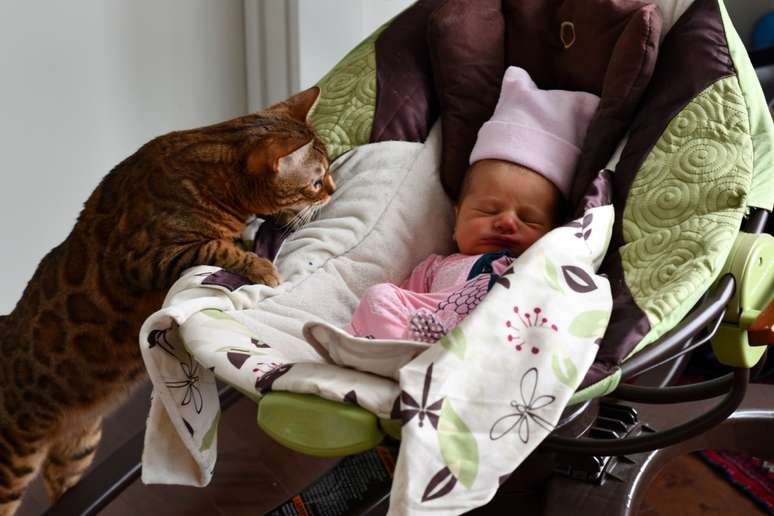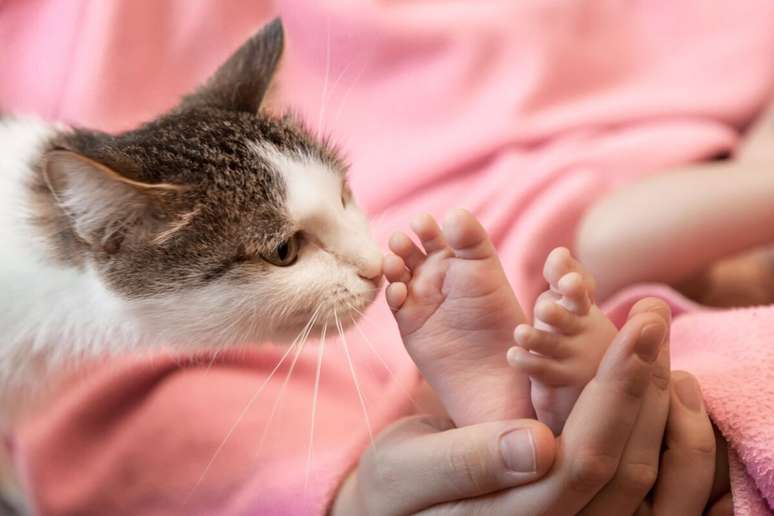Find out how to facilitate the animal’s adaptation to the new family member, avoiding stress and anxiety
The arrival of a baby is a moment of great joy for the family, but it can also cause discomfort for pets, especially cats. Routines change, new sounds and smells appear, and the caretakers’ attention is shared. These changes can generate stress and anxiety in felines, who are sensitive to environmental changes.
Stress can cause urinary marking or scratching, diarrhea, sporadic vomiting, excessive vocalization, hair loss, compulsive licking, and changes in eating and sleeping habits.
“In extreme cases, prolonged stress can also trigger more serious health problems, such as gastrointestinal disorders, skin problems or a worsening of the immune system,” says Marina Tiba, veterinarian and product manager of the Companion Animal Unit at Ceva Saúde Animal .
Therefore, it is essential prepare the cat for this new phase, creating a safe and comfortable environment for the child to adapt well and also develop a positive bond with him. Below, see how to do it!
1. Gradually introduce baby sounds
Cats have very sensitive hearing and a baby’s crying can scare them at first. To avoid this, you can expose your feline to these sounds before the baby arrives, using recordings of the cries at a low volume and gradually increasing the volume. This will help you get used to it, lessening the impact of real noise. Also, always associate these sounds with positive things, like a treat or affection, to create a pleasant experience.
2. Create a safe space for the cat
Before your baby arrives, make sure your cat has a quiet space where he can hide. The arrival of the baby changes the routine and noise levels in the home, which can stress the pet. “You cats like it of predictability. Therefore, when something changes in his environment, it is natural for him to hide to face the challenge”, explains Marina Tiba.
According to your veterinarian, it is normal for cats to need time to adjust to a new experience. “Therefore, if the animal starts to hide more than usual, the owner must be patient and create as positive, calm and peaceful an atmosphere as possible, since reducing stress will help reduce the animal’s habit of hiding,” recommends.
3. Accustom the cat to environmental changes
If you plan to make changes to the house, such as setting up the baby’s room, introduce these changes little by little. Cats do not react well to sudden changes in the environment; Therefore the assembly of the crib, the furniture and even the arrival of new smells must be done gradually, so that the animal gets used to it.
“Changing environments can be difficult for cats. They need time to get used to it. In this case, let the animal hide, providing him with safe and familiar spaces, this will make him feel at ease and he will, little by little, begin to explore and interact with the new home”, explains the vet.

4. Maintain your cat’s routine
Even with the arrival of the baby, try to maintain it your cat’s routine as stable as possible. Feeding, playing and cuddling times should not be changed drastically. These animals appreciate routine and maintaining it helps reduce stress related to change.
“We make pets less anxious, less agitated, when their routine is maintained, when the animal knows what will happen and its needs are met. Any change in its daily life increases anxiety and, therefore, it becomes more agitated,” explains Caroline Mouco Moretti, clinical veterinarian and general director of Grupo Vet Popular.
5. Introduce your cat to new smells
Before bringing the baby home, introduce the cat to the smell of the newborn using, for example, an item of clothing or a blanket that he used in the hospital. Felines rely heavily on their sense of smell to recognize changes in the environment. By familiarizing yourself with it, you will make the adjustment easier when your baby is finally home.
6. Use pheromones to calm the cat
Synthetic pheromones, found in diffusers or sprays, can help calm your cat during the adjustment period. This is because these products convey a feeling of tranquility and security, which can be useful for maintaining health relaxed pussy with the arrival of the baby.
7. Supervise meetings
When the baby arrives, introduce him to the cat in a calm and controlled way, allowing the animal to explore and get to know the newborn at his own pace – without forcing contact – and under the close supervision of adults. This ensures that the feline does not feel threatened or anxious, while protecting the child from any unexpected reactions from the animal.
8. Don’t ignore the cat after the baby arrives
Even with the demand for attention your child requires, try to set aside time to give it make your cat fond of you. This is important so that you don’t feel rejected or anxious. A cat that feels loved and secure will be more likely to adapt well to the new family member.
Source: Terra
Ben Stock is a lifestyle journalist and author at Gossipify. He writes about topics such as health, wellness, travel, food and home decor. He provides practical advice and inspiration to improve well-being, keeps readers up to date with latest lifestyle news and trends, known for his engaging writing style, in-depth analysis and unique perspectives.








